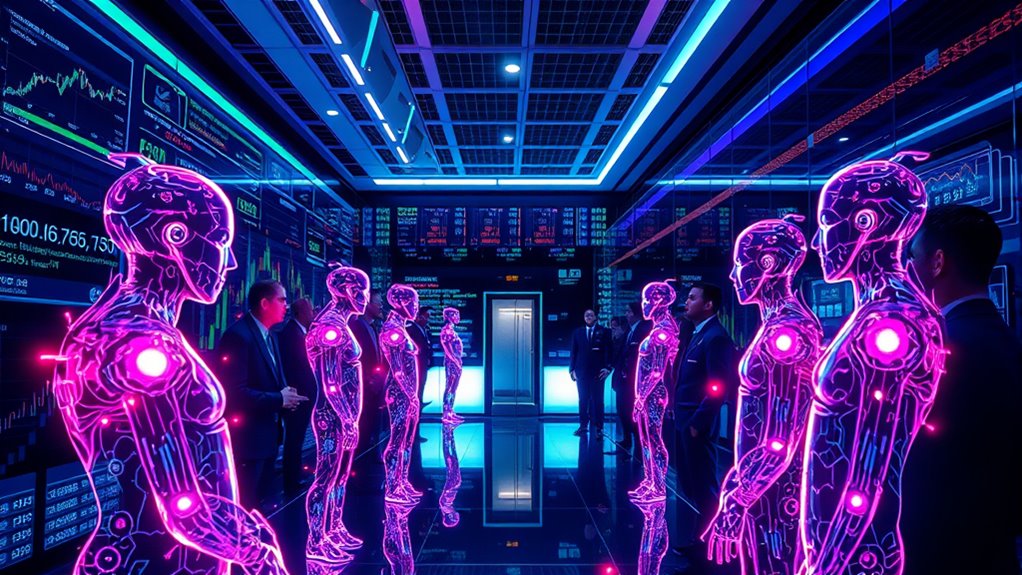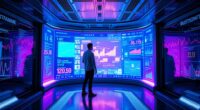AI agents now trade on your behalf and even among themselves, revolutionizing financial markets. They analyze data, blockchain activity, and social media trends to make quick, informed decisions with minimal human input. These autonomous systems adapt dynamically, respond fast to market shifts, and manage risk more effectively. This shift means smarter, faster trading—if you want to see how this technology shapes your future investments, there’s much more to discover.
Key Takeaways
- AI agents autonomously execute trades for humans, optimizing portfolios and market strategies with minimal human input.
- They analyze diverse data sources like blockchain activity and social media to inform trading decisions.
- AI agents can trade among themselves, creating a dynamic ecosystem of autonomous market participants.
- Advanced decision-making tools enable AI agents to adapt strategies rapidly in response to market changes.
- This development enhances trading efficiency, risk management, and democratizes access to sophisticated financial tools.

AI agents are transforming how humans participate in financial markets by automating trading decisions with minimal intervention. These autonomous systems are designed to perform tasks on your behalf, from gathering data and analyzing it to executing trades or implementing strategies without needing your constant input. They specialize in financial markets and cryptocurrencies, interpreting blockchain activity, social media sentiment, and market trends to make informed decisions swiftly. Unlike traditional bots, AI agents can adapt to new information and alter their strategies dynamically, learning from ongoing data rather than sticking to fixed rules. This flexibility allows them to respond effectively to changing conditions and emerging opportunities.
AI agents autonomously analyze markets and adapt strategies to optimize trading with minimal human intervention.
When it comes to decision-making, these AI agents can detect unusual market behaviors in real time. They proactively block suspicious activities, execute trades, or adjust positions without waiting for human commands. Many are role-based specialists focused on specific sectors, such as finance or crypto markets, which enhances their ability to make precise, context-aware decisions. The level of autonomy varies, but the most advanced models now act independently, improving speed, efficiency, and risk management. They leverage context and multi-step reasoning, continuously fine-tuning strategies based on evolving market signals and data inputs. This proactive approach helps manage risks by quickly responding to anomalies, while also capitalizing on fleeting opportunities.
The technology behind these AI trading agents includes large language models with extended tool usage, chain-of-thought reasoning, and function calling capabilities. These advancements enable faster processing, greater memory capacity, and real-time analysis, all critical for successful trading. They integrate diverse data sources, from blockchain networks to social media trends, providing a thorough view of the market landscape. Thanks to in inference-time compute, they make decisions rapidly without human delays. Additionally, low-code and no-code platforms are making it easier for more people to deploy these AI agents, broadening access beyond highly technical users. The increasing use of AI agents in trading highlights their growing importance in the financial ecosystem.
The impact on the financial industry is significant. AI trading agents now handle portfolio management, execute trades, and predict market trends, drastically increasing productivity while reducing human workload. Adoption is accelerating, with market growth projected at around 45% annually over the next five years. Large firms are integrating these agents into their workflows, allowing smaller teams to manage more complex portfolios efficiently. As AI agents become more autonomous, they’re not only transforming how humans trade but also how they interact with each other—creating a new ecosystem where AI agents trade on behalf of humans and even among themselves.
Frequently Asked Questions
How Do AI Agents Make Trading Decisions Autonomously?
You see, AI agents make trading decisions by analyzing vast datasets, including market trends, technical indicators, and sentiment data. They use machine learning models to predict price movements, evaluating risks with probabilistic methods. Then, they automatically execute trades based on these insights, continuously learning from new data to refine strategies. This process helps them act quickly and precisely, often outperforming human traders by eliminating emotional biases.
What Safeguards Exist Against AI Trading Errors?
Your AI trading system is protected by powerful safeguards that act like an invisible fortress. Circuit breakers halt trading during extreme volatility, kill switches shut down malfunctioning agents instantly, and real-time monitoring spots anomalies before they escalate. Automated exposure limits prevent catastrophic losses, while rigorous testing and bias audits guarantee accuracy and fairness. Backup systems, incident plans, and strict regulations keep errors from spiraling into market chaos, safeguarding your investments every second.
Can AI Agents Outperform Human Traders Consistently?
Yes, AI agents can outperform human traders consistently, thanks to their speed, data processing, and ability to adapt to market changes. They analyze vast data sets quickly, recognize complex patterns, and execute trades in milliseconds. Plus, they eliminate emotional bias and adhere strictly to risk management strategies. While they often outperform in specific areas, combining AI with human judgment can maximize overall trading success and manage unpredictable market conditions effectively.
How Is User Privacy Maintained During Ai-Driven Trading?
You maintain privacy during AI-driven trading by ensuring platforms disclose how they collect and use your data. You can exercise your rights to access, correct, or delete your info and use opt-out options for profiling or targeted trading decisions. Look for transparency reports and clear interfaces that explain AI actions. Regular audits and strong security measures, like encryption, protect your data from unauthorized access, keeping your privacy intact.
What Regulations Govern AI Trading Agents?
You need to navigate a complex maze of regulations governing AI trading agents. State laws like Colorado’s AI Act, effective February 2026, impose high-risk management and transparency rules, while California’s CCPA restricts automated decision-making. The EU’s AI Act sets strict standards for high-risk systems, requiring robustness and human oversight. You must guarantee your AI trading tools comply with these layered rules, balancing innovation with regulatory demands to stay ahead.
Conclusion
Now, you’re stepping into a new era where AI agents weave through the financial jungle, trading on your behalf like savvy explorers charting uncharted waters. As these digital maestros dance between algorithms and markets, you hold the key to a future where human intuition and machine precision collide. It’s a symphony of innovation, and you’re invited to listen closely — because in this high-stakes game, the next move could change everything.










